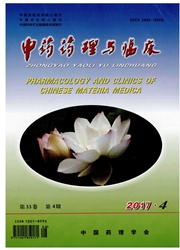

 中文摘要:
中文摘要:
目的:探讨脾虚大鼠的微观病理状态及补脾方药血清对其的调节作用。方法:采用血清药理学方法,以第三代荧光指示剂Fluo-3/AM负载细胞,用共聚焦显微镜观察大鼠单个壁细胞胃泌素刺激后[Ca^2+]i的动态变化。结果:睥虚大鼠壁细胞胃泌素刺激后[Ca^2+]i升高幅度明显高于正常大鼠,达峰时间也有缩短趋势;补脾方药血清治疗后各组中的各项指标介于两者之间。结论:壁细胞胞内[Ca^2+]i的异常变化可能是脾虚证的微观病理机制之一,Ca^2+的异常介导可能参与了脾虚证的病理形成;补脾方药血清可不同程度恢复和逆转睥虚状态下的微观病理变化。
 英文摘要:
英文摘要:
Objective: To investigate the pathogenic mechanisms of the Pi-deficiency rats in molecular level and effect of the Pi-invigorating recipe and herbal drugs serum on it. Methods: The method of serum phamacology were applied and the dynamic changes of [Ca^2+ ]i in the gastric parietal cells were measured by confocal microscope with Fluo-3/AM as fluorescence indicator. Results: The percentage of gastrin-induced elevated [Ca^2+]i magnitude in gastric parietal cells of the Pi-deficiency group was significantly lower than that in gastric parietal cells of the normal group( P〈 0.05) and the percentage of gastrin-induced elevated [Ca^2+ ] i magnitude in gastric parietal cells of the Pi-deficiency group were lowered to some extent after addition of the Pi-invigorating recipe and herbal drugs serum. Conclusion: The intracellular calcium of gastric parietal cells of the Pi deficiency rats maybe responsible for the formation of Pi-deficiency in molecular level and the abnormal mediation of the calcium is one of the possible pathogenic mechanisms of Pi-deficiency。
 同期刊论文项目
同期刊论文项目
 同项目期刊论文
同项目期刊论文
 期刊信息
期刊信息
